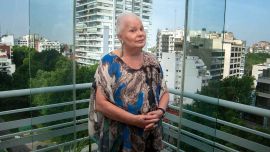Congress will begin to ramp up the gears this week as officials fine-tune details of legislation ahead of a flurry of activity in the coming weeks.
Preparations for extraordinary sessions were expected to begin on January 20, with a number of projects still pending and the government confirming it will send a host of other bills to lawmakers in the coming days.
However, on Tuesday sources told the Noticias Argentinas news agency that the head of the Peronist caucus in the lower house Chamber of Deputies, Sergio Massa, had told his UCR and PRO counterparts that sessions would likely start in the first week of February.
The delay, sources told NA, seems to have put down to the difficulties in obtaining quorum during the middle of the summer break, despite the Presidency calling for extraordinary sessions.
After talks among the ruling coalition, however, it has now been agreed that preparations will start on January 27, with a view to the first session taking place on Thursday, February 6.
First on the agenda is a bill, as agreed between President Fernández and governors, that would suspend former president Mauricio Macri's 2017 Fiscal Consensus agreement with the provincial leaders. Defence matters are also expected to be addressed with a bill that would authorise the entry and exit of troops for military exercises.
Both were approved by the Senate in the closing congressional sessions in December and await final approval in the lower house.
Also in line for debate are reforms to pension plans for judges and diplomats and bills regarding tenancy, rental agreements and short-term lets, according to reports in the local press.
Economic and Social Council
President Alberto Fernández said this week that the government's law to create a Consejo Económico y Social ("Economic and Social Council") is ready and that the initiative would be discussed in extraordinary sessions later this month.
"We have the law done already and it will be part of the things that we sent to extraordinary sessions in January," he said in an interview with El Cohete a la Luna.
He said that the Council will be integrated, with "all sectors [of the economy] involved."
Speculating over its potential leadership, Fernández said he would "love" for ex-economy minister Roberto Lavagna to take on the post, saying he had "enormous respect" for the candidate who finished third in last December's election.
"I know two people to whom you give them a problem and they bring you three solutions. One of those people is Lavagna and the other is [Labour Minister] Claudio Moroni."
Reports in recent weeks have suggested that President Fernández may also look to introduce a justice reform bill, as trailed in his inauguration speech.
Return to activity
The return to activity in Congress coincides with the return of Senate President Cristina Fernández de Kirchner.
The former head of state, who heads the upper chamber thanks to her role as vice-president, landed back in Buenos Aires on Sunday at Ezeiza International Airport, after spending the New Year with her daughter, Florencia Kirchner, in Cuba.
While Senators have not confirmed when they will return to activity, they are expected to take their seats in early February. Peronist lawmakers, headed by José Mayans, are yet to define an agenda and a date. Those details are expected to emerge when Mayans meets with Fernández de Kirchner in the coming days.
Confirmation of the new leadership of the Central Bank is believed to the most pressing concern, though that process must begin in a commission which has not yet been formed. It is expected to be headed by Mendoza Senator Anabel Fernández Sagasti, the vice-president of the Frente de Todos caucus who is known to have the vice-president's confidence.
– TIMES/NA/TÉLAM























Comments